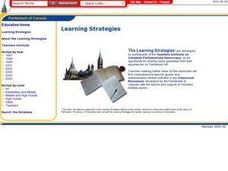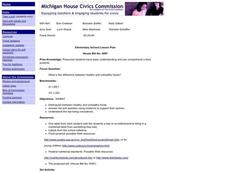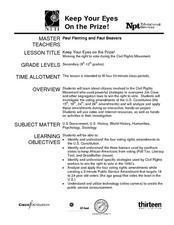Curated OER
The Right to Vote
Students discover voting barriers. In this government lesson, students explore the history of voting. Students work in small groups to analyze and debate if certain groups of people should have the ability to vote or not.
Curated OER
Government: The Power of Persuasion
High schoolers are able to define and identify a type of interest group. They are able to describe some strategies used by interest group. Students are able to identify the postive and negative aspects of interest groups.
Curated OER
Conceptual Analysis in Economics
Help develop assertive, critical-thinking skills that enhance growth and change while teaching economics. In groups, select a topic from a list and then discuss the pros and cons of each topic. Debate why advertising is necessary to our...
Curated OER
American Political Culture
Examine American political culture with your scholars using this self-assessment lesson. Individuals rate a list of 14 values from highest to lowest, including ideas such as financial security, right to private property, justice,...
Curated OER
Tactics in the Persian Gulf: From Diplomacy to Force
Students trace the United States' involvement in Iraq from 1991 to today. They interpret a map of Iraq, evaluate possible causes and effects of events. They participate in, collect and analyze a poll regarding the next steps the US...
Curated OER
Democracy Sense
Students define democracy and distinguish representative from direct or pure democracy. Then, with the focus on representative government, students will discuss and trace voting patterns in the United States.
Deliberating in a Democracy
Recycling
How often have you passed by a recycling container in your school? Scholars research the issue of recycling in the ever-changing global world. Using documentation and video evidence, they form their own opinions on recycling and how it...
Teaching Tolerance
The True History of Voting Rights
Explore what voting rights really are in an intriguing activity that explores the history of American voting. The resource examines the timeline of voting rights in the United States with group discussions, hands-on-activities, and...
Curated OER
Exercising the Franchise! The Right to Vote
Pupils research Canadian election procedures, identify candidates and corresponding political platforms for current elections and hold mock elections. They develop a written report about a specific political party.
Curated OER
House Bill No. 4097
Students identify healthy and unhealthy foods while considering a bill that would ban certain foods in schools. Through survey and discussion, they discuss a proposed legislative bill that would ban certain types of food in schools....
Curated OER
So, You Think You Understand Parliamentary Democracy ?
Tenth graders experience first hand the complexity of the political process. They analyze the relationship between party policies and the political spectrum and develop an understanding of how Canada's laws are debated and passed.
Curated OER
Voting And Elections
Students examine the voting practices of the past several presidential elections while using data to determine the influence of different factors. They identify the reasons for high or low voter turnout and then display the outcome of...
Curated OER
Election Voting Systems
Students discuss the Afghan elections and times when they have voted, i.e. student council, American Idol. Cooperatively, they create definitions for election, local council election, national government election, candidate, polling...
Curated OER
Civil Rights - What are yours?
Students explore US Civil Rights. In this us government lesson, students watch a video and then complete a worksheet on identifying and understanding their personal civil rights.
Curated OER
NAFTA Trade Unit
Middle schoolers research the geography, economics and government of Canada and how that affects US/Canadian trade relations. In this NAFTA lesson, students play a game, read about Canadian history, and creat a graph.
Curated OER
Universal Suffrage
Young scholars examine suffrage. They participate in a classroom activity in which some students get to vote and others do not get to participate. Young scholars discuss how they felt and how it wasn't fair. They write a one page essay...
Curated OER
Constitution Day: The 1965 Alabama Literacy Test
Tenth graders examine the United States Constitution. In this American Government instructional activity, 10th graders read excerpts from President Johnson's speech to Congress and parts of the Voting Rights Act of 1965. ...
Curated OER
Amendment Process
Eighth graders examine the current amendments and discuss any change they would like to make. With a partner, they develop a proposal and an advertisement to redo at least two amendments. They also compare and contrast the amendments...
Curated OER
Exploring Historical and Current Leaders of Canada
Students research Canadian political figures and then do a presentation about them.
Curated OER
Keep Your Eye On the Prize
High schoolers learn about citizens who were actively involved in the civil rights movement, and the strategies they used to overcome the Jim Crow laws that were so prevalent in the 1960s. They investigate the voting amendments of the US...
Heritage Foundation
Voting and the Constitution
How difficult was it for everyone to get voting rights? Understanding voting rights and the fight to get them for everyone in the United States can be tricky for some learners. However, they are clarified after engaging in the...
Smithsonian Institution
Students’ Response to 9/11—A Documentary Report
Young historians research the devastating attacks of 9/11 and use that information to script their own documentaries. The follow-up activity includes recording the documentary and conducting classmate interviews,
Curated OER
Rights of the Accused in Search and Seizure
Students explain the rationale behind the Fourth Amendment, and the types of activity regulated by the Constitution. They analyze situations, and explain a citizen's rights when an unlawful search or seizure is conducted.
The New York Times
Looking for Answers: Making Sense of the Boston Marathon Bombing
How should America respond to acts of domestic terrorism? What motivates or prompts a terrorist attack? After reading an opinion piece on the 2013 Boston Marathon bombing, your learners will critically analyze factors that could have...

























